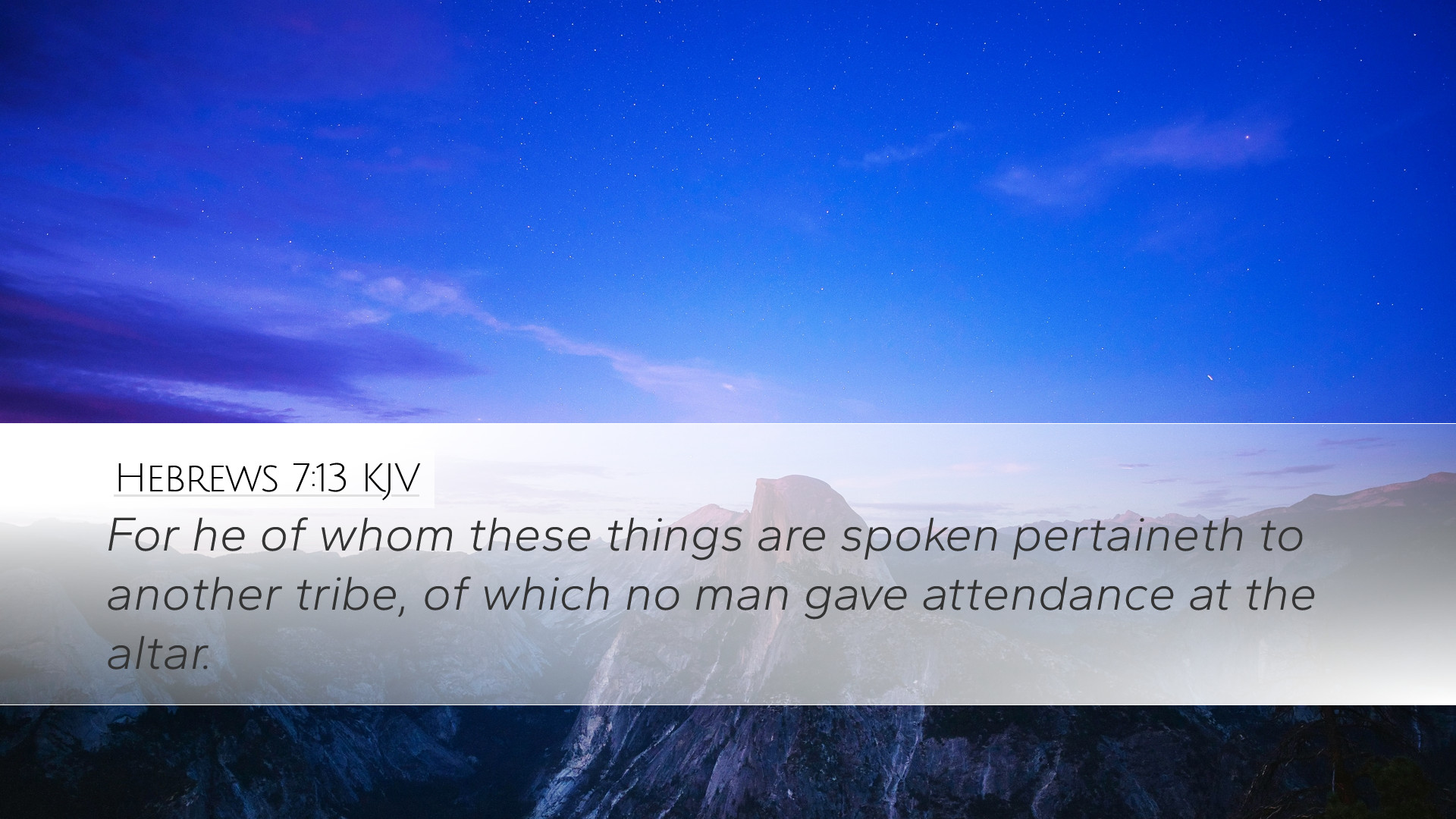Commentary on Hebrews 7:13
Hebrews 7:13 states, "For He of whom these things are spoken belongs to another tribe, from which no man has officiated at the altar." This verse addresses the unique priesthood of Jesus Christ as it contrasts with the Levitical priesthood. Below, we illustrate insights from public domain commentaries, weaving together perspectives from Matthew Henry, Albert Barnes, and Adam Clarke.
Contextual Background
This verse falls within a larger discussion outlining the superiority of Christ's priesthood over the Levitical priesthood. The author of Hebrews aims to establish Jesus as a high priest in the order of Melchizedek, marking a pivotal moment in the understanding of priesthood in Jewish tradition.
The Levitical Priesthood
The original priests in Israel were from the tribe of Levi, appointed to minister before God and offer sacrifices. As Matthew Henry aptly notes, "The priests of the law came from the tribe of Levi, the only tribe dedicated to this service." Their role was critical to the Jewish faith; however, it was limited and temporal.
The Significance of Tribe
- Tribal Distinction: The reference to "another tribe" highlights a crucial distinction: Jesus, emerging from the tribe of Judah, did not trace His lineage through Levi, the established tribe of priests.
- Mystery of Melchizedek: The author invokes Melchizedek's priesthood to illustrate that superior priestly service can exist outside established Judaic boundaries. Albert Barnes emphasizes this, noting, "Jesus' priesthood brings a new covenant that fulfills and transcends the former."
The Uniqueness of Christ's Priesthood
Hebrews 7:13 showcases the innovation of Christ's priesthood. Adam Clarke points out that "Christ does not only serve as a Priest but also fulfills the role of King, uniting both functions, which was previously unknown in the Levitical system." The dual function of Christ brings a depth of resource and blessing to believers that the Levitical priests could not offer.
Theological Implications
This verse provides rich theological implications pertaining to the nature of Jesus’ work and the new covenant established through His sacrifice. Henry asserts that "The high priesthood is greatly elevated in Christ's work, incorporating perfect sacrifice and eternal atonement as opposed to temporary offerings." The efficacious nature of Christ's offerings presents a significant shift in religious understanding.
New Covenant Realities
- Direct Access to God: The implication is that through Jesus, believers access God directly, unlike the system which required intermediaries.
- Comparison of Covenants: The contrast between the old and new covenants is vital for understanding redemption history, where the former foreshadows the ultimate reality in Christ.
Challenges in Understanding
Readers may grapple with the old covenant's inadequacies and the new covenant's power. Barnes expresses this tension clearly: "Many may feel discomforted by the abrupt transition from a familiar structure of worship to one that seems radically different." However, understanding Jesus' priesthood helps clarify God’s continuous revelation and plan for humanity.
Faith and Assurance
Ultimately, this verse encourages faith and assurance in Jesus Christ's role as our high priest. As Clarke notes, "This assurance grants believers boldness to approach the throne of grace and receive mercy." The juxtaposition of Christ with the Levitical priesthood reminds all who read Hebrews that our faith rests in a perfect mediator.
Conclusion
Hebrews 7:13 encapsulates profound truths about the nature of Christ's priesthood and its implications for believers today. By drawing from public domain commentaries, we observe the majesty of Christ’s role and the radical transformation of the believer's relationship with God through Him. As pastors, students, theologians, and Bible scholars reflect on this passage, they are encouraged to delve deeper into the dynamic interplay between the priesthood of Jesus and the Levitical order, ultimately recognizing the life-giving transformation available through faith in the Great High Priest.


